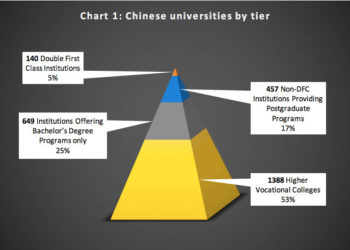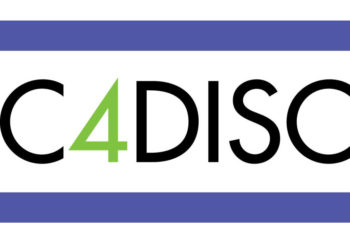Working with both Chinese and Western academic publishers and libraries, I am often astonished by the gaps in communication, to the extent that sometimes the different groups seem like two parallel worlds.
Recently I saw a LinkedIn advertisement looking for Chinese speaking Associate Editors for the Directory of Open Access Journals (DOAJ). I approached Dominic Mitchell who posted the message, and suggested he post a message on Chinese social media. The next day I noticed a post in Chinese by the DOAJ WeChat account, and shared it with my network of STM publishers. There was immediate interest, and issues. The application form was a Google Doc which cannot be opened by Chinese users since Google does not have a license to operate in China. Realizing that this could be a problem, the DOAJ post offered a Word file, available for download from a Google Drive account which was still inaccessible to Chinese users.
When I was asked about this application, I also introduced the Society for Scholarly Publishing’s (SSP’s) mentorship program, thinking it might be of interest too. I shared a screenshot of the mentorship program in the publishers’ chat groups instead of the link to the page because previously I had heard complaints about the speed of opening the SSP website. To my surprise, many people in this group (the majority of them are English STM journal editors/publishers) knew nothing about the program and in the next few days I received many questions asking about it. That was the last week before the mentorship program application deadline.

These are examples of gaps, or maybe “walls” is a more accurate word to describe it, between Western and Chinese people doing the same job in the same field. Besides language, unavailability of certain apps and different social media channels are the main causes of these barriers.
These gaps between East and West are not uncommon. What is more unexpected are the gaps between publishers and librarians, the two major players in academic communications. Because of my work, I have quite a few librarians and publishers in my WeChat network. The first time I noticed an obvious lack of communication between the two groups was when an active blogger who works more on the library side translated and posted one of my Scholarly Kitchen posts, an interview with two well-known Chinese academic journal publishers. While this post was shared by many of my library contacts, it was not mentioned once among my publisher friends and groups, before I re-posted it myself. I was thinking “Really? None of my publisher friends know my library friends?” I couldn’t help mentioning this to a librarian, and she was silent and did not respond.
More recently, Zhejiang University Press organized an online conference: the 2nd Forum on the Future of Scholarly Communication in China and the World. In three days of webinars, 19 high-profile speakers gave very informative presentations covering a wide range of topics. But what shocked me was that none of the speakers were from libraries. A discussion on the future of scholarly communication without a librarian? On reflection, I think this is probably because STM journal publishers in China do not deal with libraries directly. In China they are represented by aggregators such as CNKI, and outside China by whichever international publishers they partner with. On the other hand, research libraries in China are familiar with all major international publishers, and many have close relationships. It is also interesting that libraries in China seem to know much more about what is happening with open access publishing, and actively report on it.
The third type of gap is more obscure. It may be a chronological gap that could disappear over time. A few weeks ago, an old document from a double-first-class university in south China triggered a lot of discussion among researchers and publishers. This internal document states that, “starting from January 1, 2019, papers published in open access journals will not be recognized by the university” in performance evaluation. It was rumored that at least one other top-100 university has the same regulation. As incredible as it sounds, this reflects the perception of open access by many Chinese researchers and publishers. Twenty years ago, the same skepticism on open access publications was not uncommon in the West, but it remains surprisingly prevalent in China.
I also often encounter a lack of interest in open access from Chinese STM publishers, which is perplexing considering how hot this topic has been in the West. I attribute this to the uncommercialized status of STM publishing in China. The majority of journals are fully funded and published by universities or research institutes. Reputation and quality have always been placed above all other metrics, and the business side is much less of a concern. This attitude towards open access is changing slowly. From 2016 to 2019, the total number of open access papers published by Chinese authors in gold or hybrid journals has more than doubled, and the percentage of these papers among all papers by Chinese authors increased by 1-2% every year, to 24% in 2019 (source of data: Dimensions). Meanwhile there is more and more vocal support of open access, so it could be just a matter of time until China fully embraces it.
Gaps are not always bad. They often mean market opportunities. But people working in the academic communication industry should also improve communication between themselves to close these gaps.
Discussion
8 Thoughts on "Gaps in Academic Communication"
RE: “What is more unexpected are the gaps between publishers and librarians, the two major players in academic communications.”
Actually, the major players in academic communication are the researchers themselves. Librarians and publishers are involved in publishing (as buyers and sellers), which is somewhat different from communication. With digitization, the role of libraries is becoming ever more difficult to circumscribe, while, on the publisher side, they are discovering that the functions of publishing (registration, certification, preservation and dissemination) can be redistributed across a number of institutions that do not coincide with legacy publishers.
Amusingly, this blind angle recurs with a number of people writing in “The Scholarly Kitchen”.
I agree that this article is more about gaps among people who work for academic communication, and the title does not match perfectly. While others may have more to say about the role of libraries, I just want to point out that Chinese research libraries are actively involved in the industry change, and talk frequently to international publishers. Just today the 12th Dialogue between Librarians and International Publishers was held in China. But the connection between Chinese libraries and Chinese STM publishers seems to be much weaker. That’s what I found a bit shocking.
Many thanks for your quick answer. Two further points, if you do not mind:
1. The role of libraries in publishing functions is precisely an example of what libraries might be moving toward in a digitized environment. They used to take care of preservation in the print world; they could still do so in the digital environment, but many publishers try to take over this function. They can certainly help to register local research production (the inside-out library concept) and, as a result, they can help to disseminate. As for the editorial and format functions, various workflows can be applied with the (non-exclusive) support of libraries. The European project OPERAS and OJS in Canada are organizations to watch in this regard.
2. The notion of “international publishers” is simply a marketing device aiming at over-valuing the journals published by large, commercial, publishers. The question to be raised here is the following: does the overlay of a commercial objective on top of scholarly publishing raise the prospect of pernicious consequences for the “Grand dialogue” of scholarship. For example, the confusion maintained in some commercial sectors, between Gold Open Access and APC-Gold simply responds to replace or supplement subscription revenues with Article processing charges (also derisively known in some circles as “article prestige charges”.
Much more could be said about this, but China has the potential of realigning the dynamics of scholarly publishing with the knowledge objectives of scholarship, and do so without the “contaminating” consequences of a commercial framework.
Jean-Claude Guédon
Discussion like this is exactly what we need. “International” (or “internationalized” is a word appearing with high frequency in the Chinese community of publishing, and is pretty much used literally. It means editorial board members and authors from more countries, for example. At least among Chinese publishers, this word is not associated that much with being commercial.
“International” as a description of editorial boards is fine, but “international” as a label for multinational publishing industries is an entirely different matter.
Internationalizing editorial boards is a good way to avoid inbreeding, local political power, etc. For example, libraries collecting local research results could then network internationally with suitable partners. Once the network built up, editorial boards could be formed to take on functions such as evaluation or, more simply, stewarding the flow of comments, corrections, emendations, criticisms, refutations, etc. that should accompany any interesting piece of research made accessible to the public (this is, after all, the original meaning of “publishing”). In this fashion, the “Great Conversation” of scholarship will be nurtured and even enhanced.
This is a political comment, but as it is purely about an outcome of political policy, I think it is worth making.
If barriers to the free flow of information are erected by government, it seems a big call that those with nothing to do with erecting those barriers have to invest to find ways around it – to the benefit of those behind the barriers.
If a country wants to join the international community, then it must take action to facilitate this, not block it. Trying to have it both ways is a ridiculous. And frankly, accommodating the whims and actions of autocratic regimes is morally and ethically suspect, in my view.
Many Chinese libraries are aware of the importance of library publishing, and the gap between Chinese libraries and Chinese publishers may disappear in the future
Thank you Wei, that’s good to know and I look forward to seeing more dialogues between Chinese publishers and libraries. Just listened to a webinar recently, where two Chinese libraries described what they do to help scholars’ build and manage their publishing record. I’m sure there’s a lot librarians can provide as information managers.



